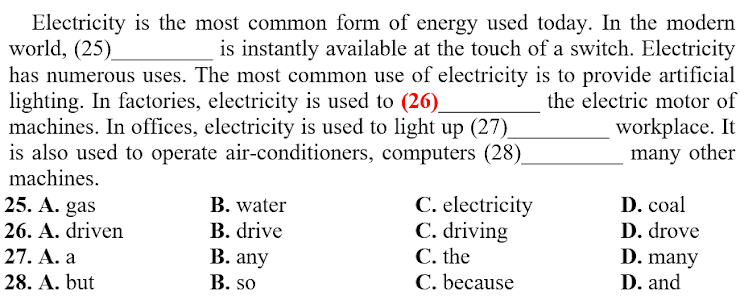Read the following passage and mark the letter A, B, C or D to indicate the correct word or phrase that best fits each of the numbered blanks from 31 to 35.
If cartoons are anything to go by, then the attitude of the British towards the family, and of British men towards the (31) ________ sex, has not changed much recently, despite attempts to shame people into admitting their prejudices. The mother-in-law, frequently of horrific (32) _______ and usually either about to visit, or being somehow driven from the house is still a favorite butt of this kind of humor. Marriage itself has been reduced to the skinny male, dominated by a massive female who habitually lies in wait with the rolling pin behind the door for the return of her drunken spouse. Children are rarely shown other than as screaming infants, or else as ill-favoured urchins who (33) _____ all their time being objectionable or asking for money. The old are simply (34) _____ as comic characters. The problem is, how do such cartoons relate to the way people truly see each other? Does a joke always contain some grain of truth, however much we may dislike to admit it? In other words, is life really a series of mother-in-law jokes? Or do jokes have a life of their own, with a (35) _______ of stereotypes we can recognize, like the Englishman with his umbrella and bowler hat, or the Frenchman with his striped jumper and beret?
Điền vào ô 33
A. waste
B. spend
C. take
D. pass


Đáp án B
Giải thích:
waste: (v) lãng phí
Về ngữ pháp thì waste time doing something không sai, nhưng trong trường hợp này, “lũ trẻ lãng phí thời gian” thì không hợp nghĩa bằng spend
spend: (v) dành, tiêu tốn
spend time/ money doing something: dành thời gian/ tiền bạc làm gì
spend time/money on something: dành thời gian/ tiền bạc cho việc gì
take: tốn
take time to do something: tốn thời gian làm gì
Trong câu này, đằng sau V ở dạng V_ing (being và asking) nên ta không dùng take.
pass: (v) trôi quatime pass: thời gian trôi qua (không hợp nghĩa)